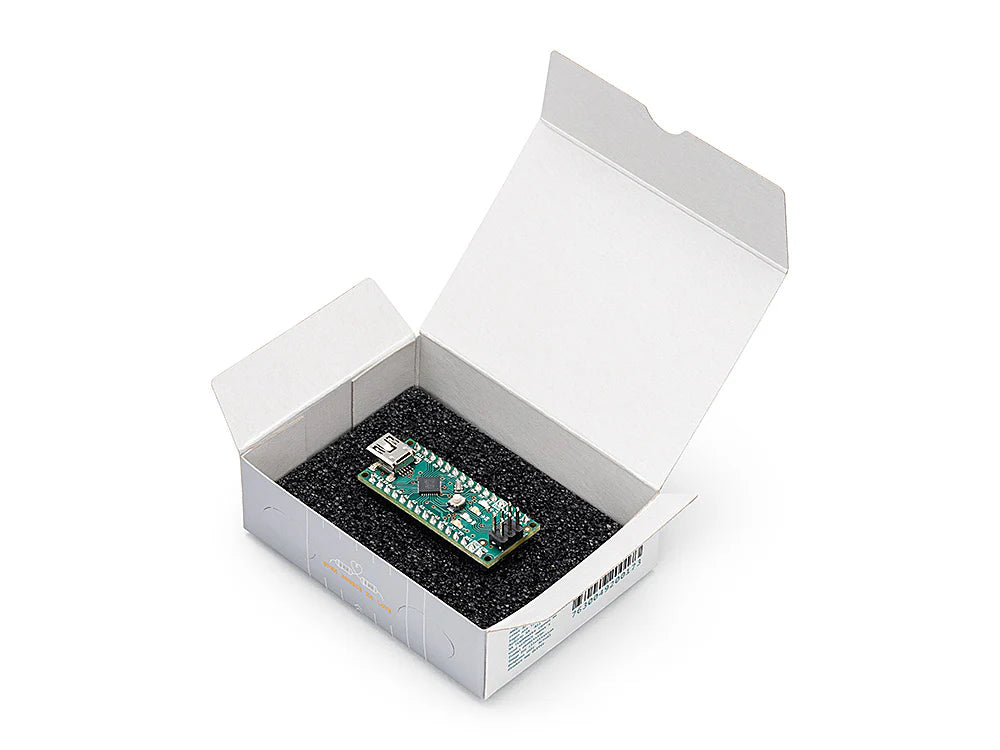Arduino Nano (ATmega328P) packs classic Arduino power into a breadboard-friendly form factor. Running at 16 MHz with 14 digital I/O (6 PWM) and 8 analog inputs (A0–A7), the Nano is ideal for compact wearables, robots, sensor nodes, and classroom builds in the Philippines. It keeps 5 V logic and the full Arduino library ecosystem, so it works with most sensors, displays, and shields via adapters.
Why choose the Nano
- Tiny & tidy: Drops straight into a breadboard; perfect for handheld and embedded projects.
- Beginner-friendly: Works out of the box with the Arduino IDE and community libraries.
- Flexible power: USB programming plus VIN/DC input for stand-alone installs.
- Stable 5 V logic: Plays nicely with common modules, relays, and many displays.
What you can build
- Wearables & handhelds: small UI with 0.96″ OLED + buttons/encoder
- Robotics: micro robot with L9110/TB6612 driver, line sensors, and IMU
- IoT sensors: environment node (DHT22/BME280), distance (HC-SR04/ToF), LED indicators
- Data loggers: microSD + RTC in a compact project box
Starter bundles (quick picks)
- Nano Learning Kit: Nano + USB Mini-B cable + breadboard & jumpers + basic sensors
- Compact UI: Nano + 0.96″ I2C OLED + rotary encoder + buzzer
- Micro Robot: Nano + TB6612FNG driver + 2WD chassis + battery/PSU
Recommended add-ons
- USB Mini-B cable (some variants use Micro-B—check photos)
- Sensor packs & displays (OLED/LCD/TFT)
- Male header pins or pre-soldered headers for breadboards
- 5V/9V/12V power supplies & barrel adapters
- Tools & multimeter for bring-up
- Cases & mounting (mini project boxes, DIN-rail)
Technical specifications
| Microcontroller | ATmega328P (8-bit AVR) @ 16 MHz |
| Operating voltage | 5 V logic |
| Input voltage (VIN) | 7–12 V recommended (allowable 6–20 V) |
| Digital I/O | 14 (D0–D13), 6 PWM (D3, D5, D6, D9, D10, D11) |
| Analog inputs | 8 (A0–A7) — note: A6/A7 are analog-only |
| Flash / SRAM / EEPROM | 32 KB (typ. 2 KB bootloader) / 2 KB / 1 KB |
| Interfaces | UART, I²C, SPI (ICSP header) |
| USB connector | Mini-USB (some variants: Micro-USB) |
| USB-UART chip | FT232 / CH340 / CP2102 (varies by board) |
| Per-pin DC current | 20 mA (observe absolute maximum ratings) |
| Dimensions | ~45 × 18 mm (breadboard-friendly) |
Pinout & power tips
- A6/A7: analog-only on the Nano (no digital I/O on these two pins).
- SPI: use the 6-pin ICSP header for reliable SPI across shields/boards.
- 3.3 V modules: add a logic level converter if a module is 3.3 V-only.
- Drivers: If your PC can’t detect the board, install the correct USB driver for the onboard FT232/CH340/CP2102.
Learning path (Nano-focused)
- Blink & inputs: LED blink, button debounce, tone
- Sensing: DHT22/BME280, HC-SR04, light/LDR
- Outputs: relays, servos, I2C OLED
- Compact logger: microSD module + RTC
- Mini robot: TB6612FNG + 2WD chassis + IMU
What’s in the box
- Arduino Nano board (headers pre-soldered or loose—see variants/photos)
Compatibility & notes
- Voltage: 5 V logic; some special Nano variants run 3.3 V/8 MHz—check your board label.
- Cables: Classic Nano uses Mini-USB; some batches use Micro-USB—choose accordingly.
- UNO vs Nano: same MCU and I/O count as UNO in a smaller footprint; perfect when space matters.
FAQs – Arduino Nano (Philippines)
Is this beginner-friendly?
Yes. Nano is easy to program in the Arduino IDE and fits directly on a breadboard for clean wiring.
Which cable do I need?
Most Nano boards use a USB Mini-B cable. Some variants use Micro-USB—check the product photos/specs.
Are the headers included or pre-soldered?
Many Nano kits include loose header strips; others arrive pre-soldered. See the variant options or gallery to confirm.
Do you ship nationwide and support school/corporate orders?
Yes. We ship nationwide across the Philippines via trusted couriers and can prepare classroom bundles and bulk quotations on request.
Arduino Nano
Arduino Nano
Low stock: 1 left
Product Code
SKU:A000005
Regular price
₱ 2,489.00
Regular price
Sale price
₱ 2,489.00
Unit price
per
Couldn't load pickup availability












